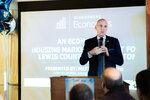




The country is unlikely to see a recession in 2024, economist Matthew Gardner told a collection of local real estate agents and community developers this week.
Gardner, chief economist for Windermere and a lecturer at the University of Washington, estimated the odds of a recession at roughly 35% and said if one occurs, it’s likely to be “really, really modest.”
“You mention a recession and people immediately go back to 2007. It’s not that. It won’t even be similar to the 2000 recession,” Gardner said of the potential recession. “It will feel a lot like the 1991 recession: very shallow, a couple of negative quarters, and then we start growing again.”
Gardner said a recession would be part of the economic cycle and would serve as a “reset.”
“For most people, they’re really not going to notice it,” Gardner said.
Gardner discussed the potential of a recession, among other economic issues, at the Lewis County Infrastructure and Real Estate Seminar Wednesday afternoon, hosted by the Economic Alliance of Lewis County and sponsored by Windermere Real Estate, Twin Star Credit Union and Washington Realtors.
“I think part of the presentation was just talking about housing shortages, real estate trends, purchase rates, short-term rentals, interest rates and infrastructure,” said Dolly Tardiff, program manager at the Business Development Center of the Economic Alliance. “So I think the more knowledge we can get across the state, and more locally, it just benefits us all.”
A challenging housing market
During the session, Gardner highlighted ongoing shortages in the housing market. Part of the challenge, he said, is homeowners who locked in low mortgage rates during the economic downturn caused by the COVID-19 pandemic.
“Mortgage rates, they are going to come down, but be patient,” he said. “But don’t give up.”
According to Garnder, 86% of homeowners have a mortgage interest rate below 5%. As of Wednesday, rates hovered around 7.7%, with rates unlikely to reach that low again anytime soon. The higher interest rates, Gardner said, mean homeowners will stay in their current homes longer. Typically, a homeowner would move for one of four reasons: death, divorce, job change and discretion. But with higher interest rates, Garnder said the lack of movement has “frozen the housing market, both locally and nationally as well.”
“Hang in there, it is going to be hard right now,” Gardner advised prospective homeowners who missed the low-interest rates previously offered.
Despite the challenging market, Gardner said homeownership remains “high on the list of needs” because “it’s how we create wealth.” While the median renter household in America has around $8,000 in wealth, the median homeowner has a wealth of $330,000.
Gardner said when looking to buy, people should meet three criteria: comfortability with the mortgage payment, comfortability with their job, and confidence of staying in the home for at least seven years.
“If you meet those three criteria, you have my blessing to buy a home,” Gardner said. “But don’t stretch it, don’t buy it just because you can and be staying awake all night worrying about a mortgage payment.”
While challenging, Gardner said “the only way” to create availability for millennials and Gen Z will be to increase supply. To do this, Gardner recommended reducing fees or other costs to encourage developers to build more housing supply in the area.
“There are ways it can be done, but you just have to get everyone on board, and the fact that in the longer term, it’s going to be beneficial,” Gardner said.